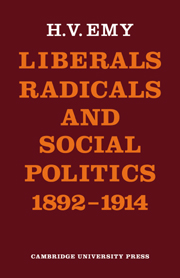Book contents
Summary
By 1914, the social problem and its ramifications, concern for poverty and social inequality, for welfare and economic insecurity, had come to form a significant test issue in modern British politics. As such, it was fast becoming the touchstone of political allegiance and of party alignments.
The significant relationship between the nineteenth century's theory of society and its political practice, loosely referred to as individualism, was an inadequate explanation of the Liberal party's own interpretation of and reaction to the social problem. Individualism was only one of the constraints at work limiting the Liberal party's acceptance of a fuller central responsibility for social reform. More importance should be attributed to the economic theory of society, to the prevailing orthodox interpretation of the necessary and proper relations obtaining between the factors of production, and to political theory itself, particularly where this included a reliance upon the Whig tradition of careful, practical and deliberate government. In this dual context, there were areas where legislation might be deemed quite irrelevant, unable to alter the economic facts (or laws) and there were still further areas, twilight zones, where social responsibility for the minimum conditions of life met economic determinism, where the actual drafting of legislation and the subsequent embodiment of an act into administrative machinery was a supremely formidable exercise; formidable not only in so far as the mechanics of the operation were concerned, but also in the probable antagonism such legislation might be expected to produce.
- Type
- Chapter
- Information
- Liberals, Radicals and Social Politics 1892–1914 , pp. 281 - 298Publisher: Cambridge University PressPrint publication year: 1973



